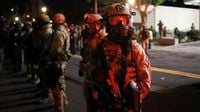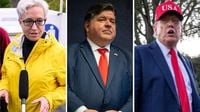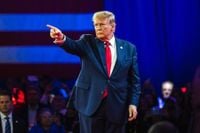In a move that has set off a political and legal firestorm, Texas National Guard troops began arriving in the Chicago area on October 6, 2025, under orders from President Donald Trump. The deployment, which was confirmed by video and eyewitness accounts at the Elwood U.S. Army Reserve Center in the far southwest suburbs, has been met with fierce opposition from Illinois officials and has triggered an urgent lawsuit by the state and the city of Chicago to halt what Governor JB Pritzker has called an “invasion.”
The arrival of camouflage-clad soldiers carrying long guns—bearing the distinctive “T” patches of the Texas Guard—was first observed at the federal facility in Elwood. According to the Chicago Tribune, a defense contractor on site was preparing sleeping quarters, showers, and a dining hall for up to 250 troops, though he admitted he didn’t know how long the soldiers intended to stay. Governor Pritzker, for his part, has refused to allow the troops to use state armories and said he received no prior notification from the federal government about their arrival.
“They have not been seen on the streets anywhere,” Pritzker told the Tribune on October 7. “They’ve not been deployed anywhere that I am aware of.” Despite the governor’s efforts to keep the soldiers contained to federal property, hundreds of guardsmen were expected to begin training on October 7 and could appear on Chicago streets later in the week, according to sources cited by ABC7 Chicago.
The White House has justified the deployment as necessary to protect federal agents amid intensifying protests against Immigration and Customs Enforcement (ICE) and a series of violent encounters with federal officers. FBI Director Kash Patel announced on social media that he was headed to Chicago, declaring, “Chicago will be saved, and this FBI will continue to crush violent crime there, and all around the country.”
President Trump, speaking in the Oval Office on October 7, did not mince words. “Chicago is a great city where there is a lot of crime,” he said. “If the governor can’t do the job, we’ll do the job.” He further threatened to invoke the Insurrection Act—a 200-year-old law allowing the president to deploy the military to suppress rebellion—if local officials or courts attempted to block his orders. “Yeah, well, it’s been invoked before, as you know. If you look at Chicago, Chicago is a great city where there’s a lot of crime,” Trump reiterated, also taking a swipe at Chicago Mayor Brandon Johnson’s approval ratings.
Illinois and Chicago responded swiftly, filing a lawsuit on October 6 to block the deployment. The suit, which calls the action “illegal, dangerous, and unconstitutional,” seeks a temporary restraining order against Secretary of Defense Pete Hegseth and argues that the federalization of National Guard troops infringes on state sovereignty and threatens to harm community relations, depress local businesses, and erode trust in law enforcement. “The American people, regardless of where they reside, should not live under the threat of occupation by the United States military, particularly not simply because their city or state leadership has fallen out of a president’s favor,” the filing states.
During a tense hearing on October 6, U.S. District Judge April Perry declined to issue an immediate restraining order, giving the federal government until midnight on October 8 to respond. Oral arguments are set for October 9. Judge Perry expressed concern over the lack of clarity from Justice Department lawyer Eric Hamilton, who could not guarantee a delay in the troop deployment. “I am not able to represent that we will do that,” Hamilton told the court, prompting further frustration from Illinois officials who accused the Trump administration of targeting “disfavored jurisdictions that the president doesn’t like.”
Mayor Johnson, at a City Hall news conference, voiced his own exasperation: “Those are all great questions,” he said when asked about the troops’ whereabouts and deployment plans. “The judge had the same questions and gave the federal government 48 hours to respond, because none of that has been clear … So no, they have not communicated. None of those things have been made clear. But one thing that I can tell you that is clear is that we’re going to hold this administration accountable.”
The deployment has also drawn sharp criticism from Illinois’ congressional delegation. U.S. Senator Tammy Duckworth accused the administration of using “Gestapo tactics in Chicago,” saying, “He wants to intimidate the people of Chicago. That’s not going to happen.” State officials argue that the federalization of troops violates the Posse Comitatus Act, a law intended to prevent the military from engaging in domestic law enforcement.
Meanwhile, Texas Governor Greg Abbott has publicly supported the president’s move. On social media, Abbott said he “fully authorized the President to call up 400 members of the Texas National Guard to ensure safety for federal officials,” adding, “You can either fully enforce protection for federal employees or get out of the way and let Texas Guard do it.”
The White House maintains that the deployments are necessary to address what it calls “civil disturbances” and “lawlessness” in Democrat-led cities. Federal memos indicate the deployments could last at least 60 days. Yet, local officials point to data suggesting a different story: according to ABC7 Chicago, there have been 458 murders in Chicago over the past 12 months—a nearly 30% decrease from the previous three-year average. Attorney General Pam Bondi, however, cited a higher figure of 571 homicides in the prior year at a congressional hearing, using it to argue for federal intervention.
The legal battle in Chicago comes on the heels of similar clashes in Oregon, where U.S. District Judge Karin Immergut temporarily blocked Trump’s plan to deploy 200 National Guard members to Portland, writing that protests there “did not pose a danger of rebellion” and that the federal government’s assessment was “simply untethered” to reality. These rulings highlight a growing judicial resistance to the president’s use of military power on domestic soil—a move rarely seen since the Insurrection Act was enacted in 1807.
On the ground in Chicago, the presence of federal agents and the looming arrival of National Guard troops have heightened tensions. Recent incidents, including the shooting and detention of a woman by immigration agents and reports of federal officers arriving in Black Hawk helicopters, have fueled fears of an escalating military presence. Demonstrations at ICE facilities have been met with tear gas and baton rounds, and critics warn that the normalization of military force in civilian life could have lasting consequences.
For now, the city waits as the courts deliberate and political leaders spar over the limits of presidential power. The next days will be pivotal—not just for Chicago, but for the nation’s understanding of the delicate balance between federal authority and local self-governance.



